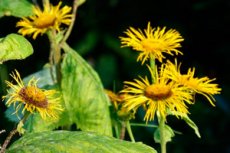Medical expert of the article
New publications
Preparations
Devyasil for bronchitis coughs
Last reviewed: 04.07.2025

All iLive content is medically reviewed or fact checked to ensure as much factual accuracy as possible.
We have strict sourcing guidelines and only link to reputable media sites, academic research institutions and, whenever possible, medically peer reviewed studies. Note that the numbers in parentheses ([1], [2], etc.) are clickable links to these studies.
If you feel that any of our content is inaccurate, out-of-date, or otherwise questionable, please select it and press Ctrl + Enter.

Dosing and administration
In recipes for bronchitis, the underground part of the plant is mainly used, i.e. the roots and rhizomes.
Decoction: for 1 tbsp. of crushed dry raw material, take 1 glass of water. Boil the mixture for about 15 minutes, then leave it to infuse for at least four hours. Take the strained medicine warm 3 to 4 times a day. You can eat no earlier than half an hour after taking the medicine. Single dose - 1 tbsp. The decoction is considered an excellent expectorant.
Infusion: 1 teaspoon of dry rhizomes is poured with a liter of boiling water and infused for 20 minutes. The strained infusion should be taken three times a day, 1 glass at a time. The infusion should be warm. Before use, add a spoonful of honey. It is considered a good cough remedy.
Cold infusion: 1 teaspoon of crushed roots is poured into a glass of water and left to infuse for 12 hours. Strained, take 1 tablespoon every hour during the day. This infusion is considered a good remedy for severe cough.
For coughs due to bronchitis and acute respiratory viral infections, you can use fresh elecampane root. It is cleaned, cut and a small piece of the root is sucked for several minutes no more than 3 times a day.
When choosing herbs for asthma and bronchitis, be sure to pay attention to elecampane, because the juice from fresh roots of the plant, mixed with honey in equal proportions, perfectly helps with both pathologies. The juice is easiest to prepare using a juicer. You need to take the sweet medicine 3 times a day. A single dose is 1 teaspoon. We take the medicine before meals, 20-30 minutes.
Contraindications
It is not advisable to try recipes from elecampane on people with hypersensitivity to the plant, severe cardiovascular and renal pathologies, chronic constipation against the background of intestinal atony, increased blood clotting. During pregnancy, elecampane can provoke a miscarriage. Treatment with elecampane is not recommended during menstruation, in women with dysmenorrhea and scanty menstrual flow. Low stomach acidity is also a contraindication.
Side effects elecampane
Side effects of the plant usually appear when the recommended doses are exceeded. They appear in the form of increased salivation, severe weakness, nausea, weakening of the heartbeat, vomiting, some depression of respiratory activity, allergic reactions.
 [ 6 ]
[ 6 ]
Storage conditions
The roots and rhizomes of the plant are collected in spring or autumn. For medical purposes, the roots of plants older than 3 years are suitable. Elecampane has long roots, so when digging them out, you need to retreat from the stem by 20-25 cm. The roots can be dried on open and covered surfaces. Large rhizomes are cut into pieces.
Plant materials are stored for about 3 years in glass, fabric or wooden containers.
 [ 9 ]
[ 9 ]
Attention!
To simplify the perception of information, this instruction for use of the drug "Devyasil for bronchitis coughs" translated and presented in a special form on the basis of the official instructions for medical use of the drug. Before use read the annotation that came directly to medicines.
Description provided for informational purposes and is not a guide to self-healing. The need for this drug, the purpose of the treatment regimen, methods and dose of the drug is determined solely by the attending physician. Self-medication is dangerous for your health.

